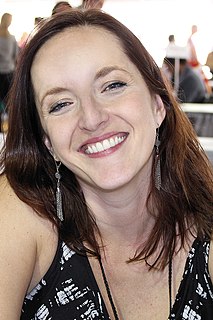A Quote by John Sayles
I think I got spoiled and that writing a short story and getting it published, or writing a novel and getting it published, you pretty much get to do the first, second and third draft yourself without a whole lot of interference.
Related Quotes
It's more like I write multiple first drafts, handwritten. So with my first novel, I wrote whole drafts from different points of view. There are different versions of that novel in a drawer on loose-leaf sheets. I won't even look at the first draft while I'm writing the second, and I won't look at the second before writing the third.
I was a lot dumber when I was writing the novel. I felt like worse of a writer because I wrote many of the short stories in one sitting or over maybe three days, and they didn't change that much. There weren't many, many drafts. That made me feel semi-brilliant and part of a magical process. Writing the novel wasn't like that. I would come home every day from my office and say, "Well, I still really like the story, I just wish it was better written." At that point, I didn't realize I was writing a first draft. And the first draft was the hardest part.
If somebody asked for the first draft of something I'd written, it'd probably be pretty close to whatever got published. I get enjoyment out of writing, but I get absolutely no enjoyment out of rewriting, so I don't do much of it. The more you work on something, certainly, the better it gets. But there's also a pretty clear law of diminishing returns.
I was first published in the newspaper put out by School of The Art Institute of Chicago, where I was a student. I wince to read that story nowadays, but I published it with an odd photo I'd found in a junk shop, and at least I still like the picture. I had a few things in the school paper, and then I got published in a small literary magazine. I hoped I would one day get published in The New Yorker, but I never allowed myself to actually believe it. Getting published is one of those things that feels just as good as you'd hoped it would.
My first book published in France was translated and titled Exercices d'Attente in 1972. It was a collection of short works written and published in Romania. In 1973 I was ready to publish the novel Arpièges, which I had started writing in Romanian and of which I had published some fragments under the title Vain Art of the Fugue. Some years later, I finished Necessary Marriage.
I taught everyone a very bad lesson at my publisher because they actually gave me deadlines this time and I'm now meeting them. I used to say, "Here's my book; it's six years late." I'm so much faster now, and work differently. With all the years of writing, I think I still draft as obsessively, but I think back to writing. On your first story, you start at draft one. On your second story, you start at draft ten. On your third story, you start at draft one hundred. If you need a hundred and eight drafts, you may write eight instead of a hundred and eight.
Almost all good writing begins with terrible first efforts. You need to start somewhere. Start by getting something-anything-down on paper. A friend of mine says that the first draft is the down draft-you just get it down. The second draft is the up draft-you fix it up. You try to say what you have to say more accurately. And the third draft is the dental draft, where you check every tooth, to see if it's loose or cramped or decayed, or even, God help us, healthy.
Writing a short story is like painting a picture on the head of a pin. And just getting everything to fit is - sometimes seems impossible. Writing a novel, though, is - has its own challenges of scope. And I think of that as painting a mural, where the challenge is that if you are close enough to work on it, you're too close to see the whole thing.







































